Peter MALONE
Saturday, 18 September 2021 19:28
Mahogany
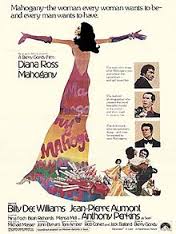
MAHOGANY
US, 1975, 109 minutes, Colour.
Diana Ross, Billy Dee Williams, Anthony Perkins, Jean- Pierre Aumont, Beah Richards.
Directed by Berry Gordy.
Of old, Bette Davis or Joan Crawford. Now Diana Ross. In fact, this lush soap opera with social overtones seems for the greater glory of Diana Ross - she stars, sings the pleasantly haunting theme, and gets the credit for costume design; and there is an enormous and lavish wardrobe to see. Diana Ross has a vitality that keeps this rags to evening gowns fashion film alive. Whether poking fun at her political friend (a genial Billy Dee Williams) or posing or clashing with an arty photographer in Rome (Anthony Perkins, yet again psychotic), she is the centre of everything. Artificial, unreal, escapist (despite the politics), yet enjoyable while there.
1. The appeal of this kind of soap opera? The critics reviewed it very poorly. It was popular with audiences. Why?
2. Why are audiences interested in the so-called Never Never Land of soap opera? The appeal of the characters, the glamour, the issues? How good an example of soap opera was this? The indication of the theme song for message?
3. How real is this world of glamour? How unreal? The significance of the flashback structure of the film and Mahogany's realization of what had happened to her?
4. How real was the presentation of the political world of Chicago? How unreal the characters in it. how credible and plausible?
5. The film was intended to be a Black soap opera. There was an emphasis on the negro point of view. Was this evident? Was it particularly noticeable, militant?
6. Audience response to Mahogany herself? At the opening fashion show, the flashbacks? Diana Ross and her style and personality, her acting, singing, wearing the clothes she herself designed? The characteristics of Mahogany, strengths and weaknesses of personality, values and stances?
7. Audience introduction to the Chicago world: Tracey and her secretarial work, her night school and dress designing. her ambitions? Her encounter with Brian and his world of politics? Brian and the real political and social issues of Chicago? An ordinary and credible world? A contrast with the future for them both?
8. Audience interest in the world of the big store, Miss Evans and her running the models. the photography., the recipe for success, etc.? How interesting was this world of fashion?
9. How credible were Tracey's ambitions and decisions? Her involvement with Sean, her standing-in for the photography. her dismissal and her work for Brian, the dilemma in her choices and ambitions?
10. The strengths and weaknesses of the character of Brian? The politician, the popular man, his appeal to his constituents, to the people working for him? His own ambitions and their clash with those of Tracey?
11. The abruptness of her decision to go to Rome? What motivated it? The contrast of the world of Rome with that of Chicago? The fashion world, the chic and empty high society? How well did she fit into it?
12. The character of Sean and his neuroses? His skill as a photographer and the way that this was visualized. audience antipathy towards him? His moulding of Mahogany's career? Her relish of this career that he created? The interaction between the two? Who was the stronger and who was the more dominant?
13. The response to the fashion shows and her being caught up in this world? Did the audience share her wish for success?
14. The people of the Roman world for example, Carlotta and her influence on Mahogany. the hold that various peoples had over her, the style of the parties. the world of advertising and the achievement of Mahogany's ambitions?
15. The contrast with Brian's arrival in Rome? His reaction to his losses in Chicago? His hopes for Mahogany? His sense of alienation from Roman society? The dramatic symbolism of the encounter with Sean and the empty gun? An indication of Brian's normality, Sean's madness?
16. The melodramatics of the accident and the way it was visualized? Was this inevitable for a character like Sean? The effect on Mahogany and her illness?
17. Rossetti and his background in Rome? His bid for Mahogany's dress when she had displayed her own design and had been humiliated by Sean? What hold did he have over Mahogany? His helping her to recuperate, the invitation to be his mistress, his financing of the show? How sympathetic a character, how credible?
18. Why was Mahogany disillusioned when her ambitions were fulfilled? She had clawed her way to the top. Why was she unsatisfied? What values appealed to her?
19. Comment on the themes of reality versus unreality, truth and appearances?
20. How authentic was the ending? Did Brian and Mahogany have a future together? The humorous repetition of the charade in the crowd and Mahogany's appeal to Brian, the irony of what had happened from the time that she had first done it? How true did this film ring? Was it phoney?
Published in Movie Reviews
Published in
Movie Reviews
Tagged under
Saturday, 18 September 2021 19:28
Mean Machine, The / The Longest Yard
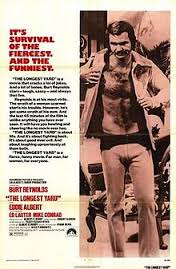
THE MEAN MACHINE (LONGEST YARD, THE.)
US, 1974, 122 minutes, Colour.
Burt Reynolds, Eddie Albert, Ed Lauter, Michael Conrad, Jim Hampton.
Directed by Robert Aldrich.
Robert Aldrich's films, including Flight of the Phoenix, Dirty Dozen, Ulzana's Raid, Emperor of the North, Grissom Gang, have received some attention in these pages. His portrayal of masculinity, toughness, violence, law and justice is a particular US vision of the world and of great interest, even if one is not sympathetic with the film or the theme. This is an unsympathetic example: prison and sport as a microcosm of violence, hate, vengeance and dominant power. The climax is a long section of a gridiron game. Burt Reynolds is the virile drifter, coward-hero, who asserts himself against warden, Eddie Albert. Comic and serious, a peculiar illustration of Aldrich's world.
1. Was this an enjoyable film? Particularly for Americans, football fans? For non American audiences? The box-office potential for this type of film?
2. The tone of the title, the reality of the football team, the atmosphere for the film? In America it was called The Longest Yard. Is this a better title?
3. How well did the film explore themes of violence, aggression, masculinity? Were these the most important themes?
4. What did the film have to say in favour of aggressiveness? Against it? Individual aggression, the aggression of masculinity? The prison system and the inter-relationships of human beings in terms of aggression? Sport as an outlet for this aggression? The administration and the love of power and its use and abuse? Did the film have insight into this whole area?
5. How successful a prison film was this? The exploration of imprisonment, isolation from society, paying for crimes etc? The interrelationship of prisoners, the interrelationship with guards, persecution and bullying, taunting by prisoners etc? Comment on the prison being presented as modern, yet a modern veneer over old realities? How real was this prison?
6. How interesting a sports film was this? The presentation and filming of football, the presentation of skill and understanding the game and playing? The role of team and team co-operation? Sport as a legitimate form of aggression and competition? The possibilities of illegitimate sport for aggression and violence? Vindictiveness?
7. Was Paul Crewe an interesting hero. Our first impression of his treatment of Melissa? Looking at the football on TV, his loving and his drunkenness and violence? His irresponsibility with the car, the chase and putting it in the harbour? Did he explain himself well? His role in the past, the pathetic story of his father and supporting him, his alleged hatred for sport, his manipulating the game for a price? What was the truth? As a man out for laughs, an easy sell-out? His own self-opinion e.g. as regards the arresting police, the warden, the warden's secretary, fellow prisoners? His fear for himself? His thinking of himself first? His showing off with the secretary? The appeal to his energy, loyalties?. The energy he gave to training the team? His easily being intimidated by the warden? why did he finally fight? The influence of Pop? What had he achieved at the end, as a prisoner, as a man?
8. How much was Paul Crewe a symbol of modern man? His irresponsibility and casual approach, the values inside which need appealing to? How can we evaluate modern man by comparison like a character like Crew?
9. What insight was given into Crew by his relationship with Melissa, the police, the police arresting, Captain Knauer, Granville, Caretaker, Nate, the negroes in the prison, the team work?
10. How did Hazen contrast with Crew. The modern warden, his position of power, his use of power and love of it, the fear he inspired, his devotion to sport and wanting to win, the fact that he had a follower with him all the time, a yes man? His capacity for being two-faced? His cruelty and unscrupulous behaviour? The reality and symbolism of the final dram and his wanting desperately to kill Crewe? The fact that he had mistaken the situation. What insight into the will to power did this characterization give?
11. Captain Krjauer: as vicious, a prison guard type? His relationship with Hazen? His brutality to the prisoners? His role as the captain, his pushing of the team? How did he compare with the other guards? The old man who murdered the caretaker?
12. Audience response to the presentation of the prisoners, life, prison atmosphere, the hard work in the swamps, the sport outlets, teamwork, morale, the prisoners code?
13. The emotional response to the caretaker's death? The impact of the funeral?
14. How interesting was the film in its showing the planning of the team, the training of the members, the types that made up the team, the interrelationships, the motivations of vengeance, the execution in the match?
15. Comment on the proportion of time given to the game. The presentation of the tactics, use of slow-motion, violence, competition, winning, the satire in the cheer leaders, the crowds? Did the climax fit in appropriately with the film.
16. How successful was the film as a drama, melodrama, comedy? Was it a pessimistic or optimistic view of human nature? Redeemable?
Published in Movie Reviews
Published in
Movie Reviews
Tagged under
Saturday, 18 September 2021 19:28
Monty Python's the Meaning of Life

MONTY PYTHON'S THE MEANING OF LIFE
UK, 1983, 112 minutes, Colour.
Graham Chapman, John Cleese, Terry Gilliam, Eric Idle, Terry Jones, Michael Palin.
Directed by Terry Jones and Terry Gilliam.
Monty Python’s Flying Circus burst onto the television world in the late 1960s with entertaining television sketches – often with non sequiturs but playing on visuals and verbal humour. They moved into making films with Monty Python and the Holy Grail and Jabberwocky during the 1970s. Both of these themes played with mediaeval stories and parodies.
However, they made their mark internationally with The Life of Brian, the parody of biblical films which was very funny – but, with sterner audiences it was considered blasphemous. This film followed four years later – a group of sketches, parodying all kinds of themes and film genres.
The members of the Monty Python Flying Circus had individual careers which took them to different films, Eric Idle and John Cleese to America. They had great success on television with Michael Palin and his travel films, Terry Jones and his historical television series. Terry Gilliam made his mark with a succession of films including Brazil, The Fisher King, Twelve Monkeys. Eric Idle in America was able to create Spamalot for Broadway which brought the Pythons together (in a musical comedy based on Monty Python and the Holy Grail).
The Pythons appear in many roles in a great range of stories which range from the presentation of an obstetrician, a schoolmaster, science fiction, the future, Mr Creosote and his greed as well as a parody of American tourists going to a restaurant (where philosophical conversations are on the menu instead of food).
There is something to entertain everyone – as well as a great potential to offend. (One of the highlights, of course, is the parody of Oliver with the song ‘Every Sperm is Sacred’ and its hits on both Catholic families and their large numbers as well as their more prim Protestant families.
1. The reputation of Python humour? Its quality? Development and tradition? Humorous laughter, satire, exaggeration, offensive humour, moralising humour? The growing popularity of such humour in the '70s and '80s? A type of British humour?
2. The stage and television origins of the humour? The reliance on brief sketches? Characters and caricatures? The nonsense tradition? Visual humour, verbal humour? The humour of situations and irony? The impact on world-wide audiences? British themes, universal targets? This film geared for an American audience? The film winning the Special Jury Prize at the Cannes Festival?
3. The strength of the six performers and their ease in working as a team? Their differing presences, personalities? Audiences bringing appreciation of the personalities to each film? The range of the performers: the range of male characters, female characters? Their abilities as mimics? The importance of song? The patter, the verbal humour (with intellectual content) and routines?
4. The importance of the songs and lyrics in this film: The Meaning of Life with its bump and grind tones and irreverent lyrics? The Sperm song with its elaborate Oliver-like choreography and staging? The School Hymn and the humour about pleading with God not to be burnt in hell? The Noel Coward take-off with its phallic content? The Galaxy Song, with its genuine awe as well as its ironic ending? Christmas in Heaven with its take-off of the Tom Jones Las Vegas lyrics, sentimental tune, choreography and staging?
5. The contribution of the animation? The opening and the focus on God and the Universe, the squashing of the Universe, the creation of humankind, the machine moulding human families, monotone housing etc.? The animation with the Crimson Permanent Assurance ?especially in its being destroyed? The mood of the animation? Visual style and skill?
6. The stances of the Python comics: the opening with the fish and their discussion about the meaning of life? The particular views of the characters? As fish? Their discussion in the middle of the film? The epilogue about basic decency and respect as the message of the fish? The stance of the comics as humanist? Anti-pretentiousness, anti-institutions, anti-pomposity, anti-dogmatic traditions? The church, society, racism, British public schools, British sport, the military, the medical profession, commercialism, violence in films, kitsch, commercial television, Ingmar Bergman and Woody Allen?
7. The brevity of the film and its pace? The ability of the comics to cover aspects of human existence? The communication of the message by humour, jolting the audience, making them thoughtful, emotional response, laughter and disgust? The comedy making demands on the audience, making it react? The device of the chapters, the captions, the deadpan and ironic voiceover?
8. The effectiveness of the prologue with the Crimson Permanent Assurance? The expert parody of pirate films: the sails, the office block looking like a galleon, the antique crew (and the flashback to Ben Hur galleys), the use of pirate movie score, the revolt of the old men, their breaking the furniture and making weapons, the choreography of their fight with cutlasses and pikes etc, the building and their executing the young men in charge of them, the satire on the young executives? The humour of the uprooting of the anchor, the building on the move, the blend of realism with animation as the galleon sailed away to the United States? The satire on Wall Street? The invasion of the United States? The old men as slaves rebelling, making the young men walk the plank? The tea lady and the songs and congratulations? The firing of the cabinet drawers as weapons etc.? The smooth American offices and their being computerised, the old man painting the sign?
9. The satire on birth and hospitals? Michael Palin as the foolish administrator, John Cleese and Graham Chapman as the craven surgeons, the staff, the bringing in of the elaborate equipment for show, the machine that went 'Ping!', their losing the mother, their expertise and the expelling of the father for having nothing to do with it, telling the mother that she was not qualified to contribute to the surgeons, the theatrical nature of the birth, the barbaric treatment of the child and showing it to its mother, the warnings about depression and leaving her abandoned? The sterility and affluence of the modern hospitals? The couldn't care less of the doctors?
10. The transition to birth in the Third World and the irony of the Yorkshire houses and streets? The stork and the dropping of yet another baby? The mother doing the washing and getting the baby taken away? The enormous number of children, the various divisions for having their meals and having baths? The naming of the children? The atmosphere of the workhouse with its dirt and grime? The father and his loss of job, speech about selling them for scientific experiments? The explanation about condoms and being a Catholic? The irony about the history of the church and its pretensions? Stances on birth control? The lyrics of the song with its emphasis on glorying in being a Roman Catholic? Its transition to the Sperm Song and God's being irate? The children singing it? The choreography? The moving into the street and the imitation of Oliver and Annie etc.? The people with the hearse, the Cardinals, the nuns? The elaborate liveliness of the song and dance?
11. The transition to the Protestants and their self-centred bigotry, assertions of freedom, the isolated couple and the elegant eating of the meal, the discussion and their fluency, the humour of the lack of sexual relationship, the discussion about Luther and the meaning of the Reformation, the wife wanting a sexual relationship? The targets of Protestant self-assertion?
12. Growing up and the atmosphere of the English public school, John Cleese's expert rendition of a boring scripture lesson? The prayer and the praise of God as being so big etc.? The satire on the meaning of prayer? John Cleese's discussion on the treatment of the cormorant and relationships with the Japanese? The offhand message about the boy's mother dying? The hymn and the plea to God not to burn them in hell? The parody of films about British public schools and school spirit?
13. The boring class about sex? John Cleese's routine about orders in school and moving clothes to the lower peg? The Pythons' impersonation of British schoolboys? The boring discussion about sex, their wavering attention, the irony of parallelling the sex class and the expected prurience with a boring maths etc? The explicit language? The teacher's wife coming in, the four-poster, the stripping and the demonstration, as if it were a scientific experiment and the reprimanding of the boys?
15. The transition to the football match, the self-assertion of the staff over the kids, their brutality, the over-exalting exulting of the staff at the winning of the match and the kids strewn over the field?
16. Fighting one another: the atmosphere of the trenches, the parallel with so many war films, the going over the top, the sentiment of the discussions before going over the top, the leader, the variety of speeches in his favour, the presenting of the clocks and watches, the alienation and criticism, the speech about the making of the cake, the various men being killed? The inanity of the situation and its comments on war?
17. The transition to Graham Chapman giving the lecture about war and the few people listening?
18. The pomposity of the military with Michael Palin's routine as the Sergeant Major letting people off drilling because they had other things to do, leaving him marching inanely alone?
19. The satire on British military tradition? The Zulu war and the echoes of the film Zulu? John Cleese as the officer shaving, Eric Idle and his leg being bitten off and his casual approach, the doctor and his soothing words and having to backtrack? The vapid talk and the presumptions of the officer class? The ordinary soldier talking of the massacre and apologising to clear the mess of injured and wounded men? The satire on the violence in war films? The search for the leg? The silly tiger routines and the verbal humour?
20. The announcing of the middle of the film with the black man unzipping his make-up, Michael Palin's routine as the woman talking about the middle of the film and the meaning of life? The interlude with the 'find the fish' competition and the bizarre characters: Graham Chapman as the woman with the corset with Egyptian postures, the man with the long arms, the mutant monster? The target of satire?
21. The fish reappearing and discussing the meaning of life and their expectations? Setting a tone for the transition to middle age and the restaurant with menus for conversations? The satire on the middle-aged American couple, the motel, the torture of people in the authentic dungeon atmosphere, the waiter with John Cleese's American patter, the cards for conversation and ignorance of the American, Michael Palin and his not wanting to know the meaning of life? The discussions about philosophy and the inanity of the discussion?
22. The episode on transplants: the Jewish man wanting to keep his liver, the satire on the gory films of the '80s? Mrs. Brown and her flirting? The emergence of Eric Idle from the fridge? The interlude of the Galaxy Song with its gentle touch - yet the irony of the ending with 'bugger all down here on earth'? Mrs. Brown giving her liver for science?
23. The satire on Noel Coward's songs - with their sexual implications, the phallic symbolism, the homosexual overtones?
24. The standard of satire with the Mr. Creosote episode? The memories of films on gluttony like La Grand Boeuf? The ugliness of the sequence? Mr. Creosote's arrival. John Cleese's impeccable and imperturbable waiter routine? The humour and satire of such waiters? The vomiting sequences and their effect? With the affluent guests in the stylish restaurant? Mr. Creosote's disregard of everybody? His vomiting over society? His bursting? The humour and ugliness of the sequence? Effective as satire?
25. The interlude with the waiter and the long tracking shots following him to his home as he explained himself ? and his reaction to the seeming condemnation of the audience for the meaningless and banality of his life?
26. The charlady cleaning up Mr. Creosote's vomit and discussing the important places where she had worked ? without learning anything? The culmination of her anti-Semitic statement with the waiter's reaction?
27. The transition to death: Graham Chapman being pursued by the topless girls with their crash helmets, the funeral group waiting by the seashore and his catapulting into his tomb? The humorous but serious look at death?
28. The appearance of Death - echoes of Ingmar Bergman's and Woody Allen's films? The croaky Grim Reaper and his not being understood? Trying to make his presence felt, even walking through the table? British hospitality? The chatter and the fashionable chatter about death in the late 1970s? Death telling the Americans to shut up? Attacking the British for their primness? The American wife trying to one-up Death? The American man and his incessant talk? The English hostess? The drunk wife? The revelation about death and the humour of their taking their cars and driving to eternity? The animation touch before heaven?
29. Heaven and everybody being at the Las Vegas style restaurant: Zulus, Mrs Brown, the orphans etc.? The motel style with its smooth talk? The Las Vegas stage and the Tom Jones imitation with the irony of Christmas in Heaven?
30. The comments at the end of the film and the basic meaning of life as decency and respect? The ironic comments about audience capacity for controversy and the salacious? The slap at video and television watchers?
31. The humanist values in The Meaning of Life? The search for transcendent values? Genuine religious values? The film putting audiences in touch with important questions via comedy, critique and moralising?
Published in Movie Reviews
Published in
Movie Reviews
Tagged under
Saturday, 18 September 2021 19:28
McVicar
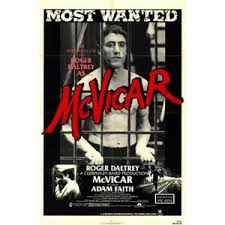
McVICAR
UK, 1980, 112 minutes, Colour.
Roger Daltrey, Adam Faith, Cheryl Campbell, Billy Murray, Georgina Hale.
Directed by Tom Clegg.
McVicar is yet another prison film with the same sequences of defiance, brutality, warders and prisoners bullying one another. It focuses on one prisoner, John McVicar, who has been a media personality and commentator. During the film, this future seems highly unlikely as he robs (with violence), escapes and serves his sentences, his rehabilitation does not seem a probable prospect and the information is given only at the end. Which tends to leave a conventional enough story, played well by Roger Daltrey as McVicar (plus a range of songs by Daltrey in the background). Director Tom Clegg is from television (The Sweeney) and the film runs like a competent TV movie.
1. Audience interest in and enjoyment of prison films? The American prison film tradition, the British? The focus on the criminals? Warders? Way of life within the prison? The filling in of background of characters? Justice and injustice? Escape? How conventional was this material? How conventionally presented? The background of the writer-director in British television and focus on police films e.g. The Sweeney? The contribution of John McVicar himself?
2. The portrait of McVicar - as a person in himself, the criminal mind and type, his background of crime, his finding himself in prison, the way that he handled himself in prison, escape, with his family? The information given about his subsequent study and media career? How credible was this? On the basis of the film?
3. What was the purpose of the film: a slice of British life, a slice of prison life, insight into character, prison? All of these; if so, how well blended?
4. The contribution of Roger Daltrey to the film - producer, actor, the range of his songs in the background? The importance of the songs, their lyrics, mood, placement throughout the film? Roger Daltrey as a music superstar impersonating a crime superstar? The backgrounds of British sub-cultures and celebrities during the '60s, '70s and '80s? e.g. McVicar, Ronald Biggs?
5. How well did the film sketch in McVicar's background? Portray his personality? The reasons for his crimes, violence? The exploration of his mentality? Seeing him in prison, relating with people, cheeky? Friendship with Probyn and the plan to escape? The execution of the escape?
6. Survival in prison and the emphasis on expected detail? How vividly presented, protest, occupation of prison areas, reaction against regulations, McVicar in solitary, the straitjacket etc.? The effect on his personality, mind, determination? The ugly aspects of prison life?
7. The presentation of the escape, the methods, the digging, the cover up, the tension? Harrison and his being in on the plan, the decision to leave him behind, raising the alarm?
8. How well did the film make comment on the issues within the prison - the nature of the regulations, strictness of interpretation, prisoners' rights, rough treatment, the effect on the warders and the administration?
9. The sketch of Probyn, as friend, support? His help in the escape, the irony of his being caught?
10. McVicar and his sense of freedom, the encounter with Davis, his being delivered to Davis' house, the meeting with Kate, her cooking the meal, the sexy emphasis? ? with a humorous and ironic touch?
11. The warmth of the portrayal of Sheila and McVicar's son? Their home, way of life? The re-establishment of the relationship with Sheila? His needing to met his son, the gradual revelation of his being his father? The sentiment of the domestic sequences? The effect on his son? Their plans for going to Canada?
12. The need for money, McVicar once again robbing and shooting? The possibility of change? Davis informing and the build-up to his capture and arrest?
13. The postscript and the information about McVicar's study and his subsequent career? Did the film give evidence that this. was? possible?
14. How satisfying the insight into prison life? A personality ? type, change? British society in the 60s and 70s? Family and relationships? An ironic celebrity?
Published in Movie Reviews
Published in
Movie Reviews
Tagged under
Saturday, 18 September 2021 19:28
McQ
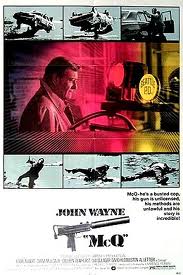
McQ
US, 1974, 11 minutes, Colour.
John Wayne, Eddie Albert, Diana Muldaur, Colleen Dewhurst, Clu Gulager.
Directed by John Sturges.
McQ is a police story. With very little change to the screenplay, this could have been a Dirty Harry-type thriller. As it is, it is John Wayne doing his thing in Seattle, single-handed too because of his distrust of the law and his clashes with the lawmen. The film, via Wayne and his beliefs and style, shows how U.S. police sagas are cousins (brothers?) of the Western. A strong hero, with the gritty courage of his convictions, ferrets out the evil in a gun happy culture and shoots his way to a solution. This is second nature to Wayne and is expected of him. Drug-peddling, a beach car chase, intimations of sex: in fact, a competent Hollywood thriller.
1. Was this an enjoyable detective film? What conventions of the detective thriller did it use? How well? Comment on the use of John Wayne as a detective hero. Was he effective? What values did he embody for the whole film?
2. What did the film have to say about modern cities and violence? The lawmen with his gun? The need for so much shooting to solve problems? How did this film show the detective thriller as related to Westerns? The American tradition of good and evil? Of violence?
3. Comment on the effectiveness of the pre-credit sequences and our attitudes towards policemen and their committing violence? How did this set a tone for the film? The need for the truth to be sought out and for justice to be done? Did it indicate the complications that were to follow because of police involvement? Was this a good way to begin a thriller?
4. How sympathetically were the police presented in this film? Especially Costerman? Did you think that he was crooked? How did the film, with its twists, alter our sympathies for the police? Did you expect the main criminal to be the criminal? Why?
5. How did McQ fit into this police situation? How sympathetic was he? The initial John Wayne good humour followed quickly by an attempt on his life and shooting? Why could he not fit easily into the framework of the law? was it his fault? (Especially when one realised at the end that the police were suspicious of him? Thought he was the criminal?) How well did he operate away from the law?
6. Comment on the picture of the drug situation in the modern cities. The drug users and the pedlars? The police abuse of secrecy and privilege? The big money to be made? This as seen by Louis's tempting of McQ? How anti-drugs was the film?
7. How interestingly did the film present McQ's independent research and attempts to track down the criminals? How much is this part of the American hero? The independent hero? Searching for the truth and wanting to administer justice?
8. The elderly saloon woman: what did she add to the tone of the film? As a typical city character? Her collaboration with McQ? Her flirting with him? The impact emotionally of her murder?
9. Did you like Lois? Did you at all suspect her of being criminal? What reaction did you have for McQs attraction towards her and vice versa? How was this broken at the end when the truth was revealed? Did you have any sympathy for Lois at the end?
10. was the car chase merely added for cinematic effect and because it has become part of the tradition of thrillers? Did it contribute well to the film? The use of the beach for the car chase?
11. How plausible and real was the story? The big money dealt with, the big plans? The complications of the big syndicate boss, hiring gunmen and their being tricked? The reality of murders? What comment on modern society does this make?
12. How entertaining was the film? Was it meant to be sheer adventure entertainment? or did it have some message? If so, what?
Published in Movie Reviews
Published in
Movie Reviews
Tagged under
Saturday, 18 September 2021 19:28
Maytime
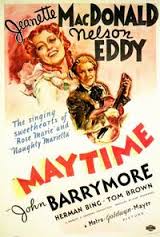
MAYTIME
US, 1937, 132 minutes, Black and white.
Jeanette Mc Donald, Nelson Eddy, John Barrymore.
Directed by Robert Z.Leonard.
Maytime was one of the most popular Jeanette Mc Donald- Nelson Eddy operettas. Set in the 19th century, both in France and in America, the film has an opera background and culminates in melodrama. It is also a romance with a sinister background, John Barrymore as a Svengali-like manager for Jeanette Mc Donald.
Based on a play, the film has music by Sigmund Romberg and some opera pieces based on Tchaikowsky's music. The film is set in the unreal world of operetta, something like soap opera with style and class. This kind of film was extremely popular in the 1930s and 1940s.
1. The impact of operetta entertainment? Its popularity in the '30s and '40s? This film as a classic of its kind?
2. M.G.M. production values, black and white photography, lavish sets and costumes, re-creation of period? Staging of musical numbers? The music of Sigmund Romberg? The use of Tchaikowsky for opera?
3. Audiences accepting the conventions of operetta? Period, characters, contrived and heightened situations?
4. The styles of Jeanette Mc Donald and Nelson Eddy? Singing? opera?
5. The setting: the Maytime atmosphere, the fair, the young lovers, the auditions for the heroine, the sadness of the hero? The encounter with Miss Morrison and her companion?
6. The flashback: Marcia Mornay and her career in Paris, success, society, the court of Louis Napoleon, Nikolai and his influence, Paul and his attractiveness, the time together, 'Sweethearts', Marcia's fear, Paul's visit to the dressing room, Marcia's choice, her gratitude towards Nikolai and rejecting Paul? The consequences?
7. The world of opera, of Louis Napoleon, balls, divas, spectacular careers? Nikolai and his presence, controlling the career, the sinister touch, his passion for Marcia?
8. Paul and his study, penniless, his tutor and friends, taking the front row in the opera, being ousted and applauding, his visit to the dressing room, Marcia's rejection and his being hurt?
9. The passing of the years ? Marcia and Nikolai and their success, the return home, the loveless marriage?
10. New York and the businessmen, the preparations for La Traviata, the change of opera, the irony of Paul being the leading man, the rehearsals, the performance?
11. The crisis at the end of the performance. Marcia and Paul loving each other, talk of divorce? Nikolai’s reaction? The shooting? Death and grief?
12. Miss Morrison reuniting the couple - and the heroine giving up her auditions! The happy reunion of the ghosts of Marcia and Paul and 'Sweethearts'? An appropriate ending to this kind of operetta?
Published in Movie Reviews
Published in
Movie Reviews
Tagged under
Saturday, 18 September 2021 19:28
Maverick Queen, The
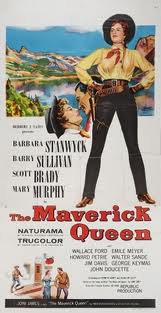
THE MAVERICK QUEEN
US, 1956, 90 minutes, Colour.
Barbara Stanwyck, Barry Sullivan, Scott Brady, Mary Murphy, Wallace Ford.
Directed by Joseph Kane.
The Maverick Queen is one of many standard westerns made by Republic over the 1940s and 50s. It has a strong part for Barbara Stanwyck who is matched by Barry Sullivan and a strong supporting cast. It takes up echoes of the James and Younger brothers' outlaw days, with a touch of Butch Cassidy and the Sundance Kid. Director is Joseph Kane, regular director of so many of Republic's action films. The original novel was by Zane Grey. musical score by Victor Young. Efficiently made but standard fare.
1. Entertaining and competent western? The conventions of the West, the range, farms, outlaws, the law and justice? Showdowns?
2. The use of conventions and audience expectations of these? Barbara Stanwyck as heroine villain? The deception of the law? The confrontation with outlaws? The life of the western town etc.? Standard or different?
3. Colour photography, locations? The town, the cattle runs? The outlaws' hideouts? Confrontations and special effects? Victor Young's score?
4. The basic plot and audiences enjoying it? Kit Banyan and her power in the West? Jeff Younger and the outlaw connection, working with Kit, undercover agent? Lucy Lee and her ranch? The background of outlaws with Butch Cassidy and the Sundance Kid?
5. The title and its focus on Barbara Stanwyck? Her screen presence? The strong American woman of the West? Upholding the law, around and against the law? Her power, ruthlessness? The way this was illustrated? Her owning most of the town, her employing people? Doing business with the outlaw gangs? Her falling in love with Jeff? Her clash with Lucy Lee? The discovery of the truth? Her dilemma? Her warning Jeff ? and her death? The typical character of the West?
6. Jeff Younger and his reputation, riding into town, the stranger who changes the town? Offer of job by Lucy Lee? Friendship with Jamie? Deals with Kit? Infiltrating the gang? His identity ? his being taken, Kit's giving her life for him? His future with Lucy Lee? The role of the Pinkerton agency and detection of outlaws?
7. Lucy Lee as the contrast with Kit? ownership, cattle? a potential Kit? on the right side of the law? Attraction towards Jeff? Clashes? Reliance on Jamie?
8. Jamie - the sentimental and humorous touch? Loyalty in the West?
9. The sketch of well known outlaws, especially Butch Cassidy and the Sundance Kid (and later mythology)? The outlaws of the West, motives, action, violence? Robberies, double deals, hideouts, showdowns?
10. Themes of the opening of the West, ownership? Individual ruthlessness and possessiveness? The clash of power and love? Law and justice and its administration? The detection of outlaws? The tradition of the West - the American heritage?
Published in Movie Reviews
Published in
Movie Reviews
Tagged under
Saturday, 18 September 2021 19:28
Matter of Who, A
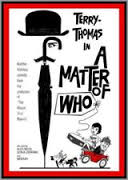
A MATTER OF WHO
UK, 1962, 90 minutes, Black and White.
Terry Thomas, Alex Nicol, Honor Blackman, Sonja Ziemann.
Directed by Don Chaffey.
A Matter of Who is a routine thriller which focuses on the World Health Organisation and uses it as a basis for international intrigue and justice questions. Terry Thomas appears in a more serious role than usual.
1. The tone of the title and its meaning? What did the song add to the film or did it detract from it? The use of the music as a theme (without the words)?
2. How interesting as a thriller was this film? Did it maintain interest? What thriller conventions did it use? How well?
3. What kept audience interest? The theme of the film or identification with characters, or both?
4. How well developed and explained was the oil situation? Did it have an air of credibility? Its similarity to many T.V. series? Does the film win in comparison? Why? The portrayal of double-crossing, greed, the types involved in such deals?
5. How interesting were the health questions? Was this portrayed well and credibly? The efficiency for tracking down disease? The style of people involved in this particular work? Why do audiences have interest in world health?
6. What attitudes towards justice did the film take? The official level of justice and its openness to corruption? Banister taking justice into his own hands? Was he justified? His methods? Audience sympathy for these? Is this necessary when official channels are wrongly closed?
7. How interesting a central character was Banister? How typical of Terry Thomas's performances was it? The way he was made to handle the main plot? The incidental details of his wry comedy, dialogue, driving power, etc.? was he a fitting hero for this kind of film?
8. How did he contrast with Kennedy? The contrast of the British with the Americans? American bluntness and brutality? Their relationship to Michelle? was this real or was it contrived for the film? The ending?
9. How well drawn were the minor characters? Did they seem authentic? Did they represent real human behaviour? Jamison and his support of Banister and work in the office, the official people at the Health Department? Sister Bryan and her efficiency and her relationship to Banister, the admiring phone woman, the people at the party, Ivanovitch and his villainy, the Arabs, Beryl and her stupidity and the dog, Michelle herself as an enigmatic heroine?
10. How was the film aided by its use of locations ? London, Austria? Was the climax appropriately dramatic or did it seem melodramatic? How successful was the film's suspense? On the whole was the film a satisfactory thriller?
Published in Movie Reviews
Published in
Movie Reviews
Tagged under
Saturday, 18 September 2021 19:28
Matilda
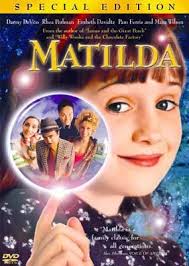
MATILDA
US, 1978, 105 minutes, Colour.
Elliott Gould, Robert Mitchum, Harry Guardino, Clive Revill, Lionel Stander, Karen Carlson.
Directed by Daniel Mann.
Matilda is a family film - though one wonders for what audience. With Elliott Gould and Robert Mitchum as the stars, it has a certain appeal to adults. The whimsical tone and the background satire of gangsters and boxing also indicate an older audience. However, the story told, the focus on Matilda as a successful boxing kangaroo and his exploits seem to indicate the film as more suitable for younger audiences.
The drawback of the film is the not having a genuine kangaroo as Matilda, but an actor dressed up as a kangaroo. It seems to undermine the credibility - especially when the emphasis is on a genuine kangaroo as having boxing skills. Elliott Gould does his usual frantic routines as a hustling entrepreneur. Robert Mitchum is very dignified as the boxing newspaper correspondent. Clive Revill has an engaging role as Billy Baker, the manager of Matilda. With the American settings, an introductory song sung by Pat and Debbie Boone, the slapstick American humour and the emphasis on the animal, the film seems to be the typical American ingredients family comedy. Direction is by Daniel Mann who directed such Oscar-winning performances as Shirley Booth in Come Back Little Sheba, Anna Magnani in The Rose Tattoo. He seems to be having time off for recreation with this film.
1. The appeal of the film. its entertainment value, for an adult audience, family, children? For Americans? Australians ? with the emphasis on Matilda the kangaroo?
2. The New York opening, the atmosphere of America, a cross-section of cities and landscapes, from New York to Reno? The opening song and its tone? Colour photography?
3. Realism and fantasy, in the story, the character of Matilda? The effect of the productions not using a real kangaroo? The various types, the managers, hustlers, Association for the Prevention of Cruelty to Animals, the gangsters, newspaper writers? How well did they blend?
4. The initial focus on Billy, his invitation to the audience, the telling of the story, a genial man, his boxing history, arrival in America, the accident in the streets with Matilda, the encounter with Bernie, releasing the animal, Kathleen and her wanting to prevent Matilda’s fighting, following the fights around the countryside after the carnival knockout, Billy's trust in Bernie, his capacity for handling Matilda, his fears for the fight at the end? His success and the telling of the story ? meeting Bernie and his family? Engaging the audience via this kind of direct talk and storytelling?
5. Matilda seen with Bernie? The appearance, animal manners, the human being under the kangaroo makeup? The feminine name and the boxing ability? The origins in Australia, the explanations about kangaroos and boxing? The accident, in the taxi, the knocking out of the champion at the carnival? Bernie's signing him up? The career throughout the countryside? The collage of knockout fights? The training in Nevada? The build up to the final fight? The sympathy of the audience, the change to the champion? Matilda being hit and retiring? Producing boxing sons? Matilda as an engaging character for family entertainment?
6. Bernie and Elliott Gould's hustling style, Pinky and the agency, the boxing and the gangsters? Taking advantage of opportunity, hustling up contracts, getting Duke Parkhurst to be at the carnival, the champ? The knockout? The clash with Kathleen and the joke about the shoes? Promoting Matilda’s career? The blockage in California? The intrusion on the TV show and the advertising? The build up to the fight? His discovery that he was being used by Duke and his willingness to go along with this? The throwing in the towel? The losing of Matilda but gaining a family?
7. Duke and Robert Mitchum's style? His work on the paper, his wanting to expose the gangsters, his amazement at the carnival, his betting at the fight? His hold over Bernie?
8. The incidental characters - Pinky and his agency, his ridiculing of Bernie, his being in league with the gangsters? Uncle Nono and his gang of gangsters, their meetings, the knockabout humour in their attempts to get Matilda? Uncle Nono and his desperation? The final bet, his retiring from the United States and breeding kangaroos?
9. Gordon and his driving of the taxi, his arranging with Duke, his partnership, his contribution to the atmosphere of comedy?
10. Kathleen and her work for the animals, the clashes with Bernie, the fascination, her brother, the happy finale with the family?
11.The various supporting characters - the champ and his fighting with Matilda after such preparations, Tanya and her luring him into it, her career? P.S.: Michael Willesee can be seen briefly at the Reno fight as the commentator.
Published in Movie Reviews
Published in
Movie Reviews
Tagged under
Saturday, 18 September 2021 19:28
Masters of the Universe
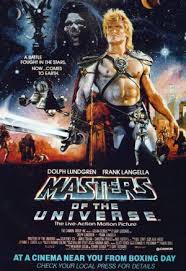
MASTERS OF THE UNIVERSE
US, 1987, 106 minutes, Colour.
Dolph Lundgren, Frank Langella, Meg Foster, Billy Barty, Courtney Cox, Cristina Pickles.
Directed by Gary Goddard.
Masters of the Universe is space and galaxy action, based on comic magazines. The film re-creates this style, quite entertainingly.
Dolph Lundgren (Rocky IV, Red Scorpio) is He- Man. Frank Langella, covered by a skeletal mask, is the villain Skeletor. Meg Foster enjoys herself as Evil Lyn.
The film has sequences in the galaxies but then suddenly comes to Earth and there is confrontation in an ordinary American town. Set designs, costumes and special effects are important. The score, by Bill Conti, is reminiscent of John Williams' scores for the Star Wars series. In fact, the whole enterprise with characters, monster warriors, Skeletor in black, are reminiscent of Star Wars.
1. Comic book space adventure? In the Star Wars tradition?
2. The sequences in the universe, the galaxies, the contrast with Earth? Kingdoms in space, Greyskull? The importance of special effects, stunts? The Star Wars style score?
3. Struggles and battles of good and evil, magic keys, the Earth people contributing to the battles for the universe?
4. The situation in Greyskull, Skeletor and his control, Evil Lyn and her helping with the robbing of the key, the confrontation with He-Man? and his warriors? The key and the search through the universe for it?
5. Skeletor as evil, wanting to rule the world, his appearance, manner of speaking, the spell over the sorceress? The search for the key, the battles, the sending of the monsters and their failure, his killing one? His going to Earth, battles on Earth? His defeat?
6. Evil-Lyn?, her support for Skeletor, getting the key? Her sending of the warriors, their failure? Her going to Earth herself, the confrontations and battles, her disguising herself as Julie's mother to get the key? Defeat?
7. The sorceress, the warnings, her being held in prison, her ageing? The final time and her release?
8. He-Man? as the hero of the universe, his appearance, style, the battles, joining with the warriors? Going to Earth, Julie and her fear, his saving her? The battles on Earth, confrontation with the policeman? His being captured, taken with Skeletor? The final rescue?
9. Guildor, the dwarf, the making of the key, the robbery, his humour and comedy, going to Earth, trying to adapt to Earth, talking to the cow, the clothes, people's reactions to him? His contribution to the battle?
10. The warriors, the man and the woman, standing by He- Man, their help on Earth, the battles?
11. Kevin and Julie, on Earth, the ordinariness of their lives, jobs, plans? Julie and her grief about her parents? The discovery of the key, the music, remembering the melody, taking it to the music shop? Their separation, the preparation for the evening and the arrival of the space people, the monsters, Julie and her fear? Kevin and the confrontation? The police? His giving them the melody, the chord? Restoring everything, going to the kingdom? Going back to Earth, the day before Julie's parents were killed? Julie and her being deceived by Evil-Lyn? in the disguise of her mother?
12. The policeman, his obtuseness, the siege, wanting to put people under arrest, going to Greskull, deciding to live there?
13. Expected action, characters, adventure? The blending of the galaxies and Earth? Comic book style?
Published in Movie Reviews
Published in
Movie Reviews
Tagged under